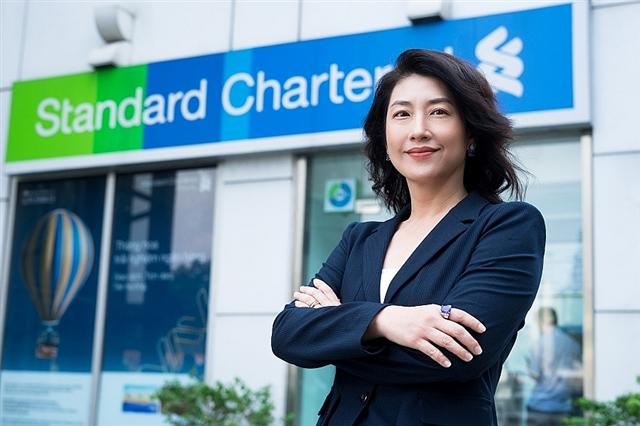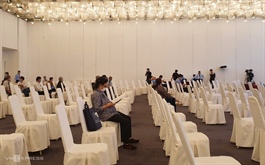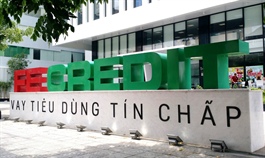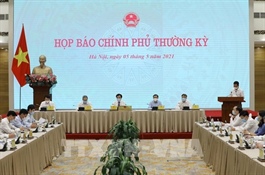Vietnam shining bright as appealing investment venue
Vietnam shining bright as appealing investment venue
Despite pandemic implications, Vietnam continues to coax a steady increase in foreign investment inflows. Michele Wee, CEO of UK-backed Standard Chartered Vietnam, delivers a comprehensive picture about the country’s foreign direct investment, focusing on how Vietnam can retain its appeal and how Standard Chartered Vietnam could support the process.

Michele Wee, CEO of UK-backed Standard Chartered Vietnam
|
Given the impact of COVID-19 and the vaccination plan, what is the outlook of foreign direct investment into Vietnam in the short and medium terms?
We believe that inward investment in Vietnam will remain strong in the medium-term. Vietnam continues to be an attractive investment destination given its strong fundamentals of a fast-growing economy with a young and well-educated labour force, a growing domestic market, and its strong commitment to integration with global markets and supply chains.
It has also been one of the world’s most successful countries in containing COVID-19. Vietnam saw a GDP growth rate of 2.91 per cent in 2020. Although this is the lowest rate in the last 30 years of development, it is the highest growth rate among Asian countries and one of the highest growth rates in the world due to the pandemic.
| Ongoing investment relocation to Vietnam due to the US-China trade and technology dispute, which is prompting the sustained relocation of low-tech manufacturing to Vietnam from China will also support continued FDI flows to Vietnam. |
Depressed investment sentiment and lingering global COVID-19 uncertainty may continue to dampen foreign investment flows to Vietnam in the short term. Pledged foreign investment volume – an indicator of future investment – rose 18.5 per cent on-year in the first quarter, while disbursed foreign investment value rose 6.5 per cent. That said, global vaccine rollout should support a gradual recovery in global demand and investment appetite. This is evidenced by the recent improvement in export data from Asian countries. Vietnam’s exports rose 22 per cent on-year in the first quarter; imports jumped 26.3 per cent, and the trade surplus was $2 billion. These are positive data.
Through the reported GDP and foreign investment picture of Vietnam in 2020, foreign investment flows to Vietnam should continue to improve in 2021 and 2022, supported by a better global backdrop. Vaccination has begun in Vietnam on March 8, 2021; wider vaccination rollout expected in the third quarter and is a precondition for a tourism rebound and a sustainable economic recovery. Ongoing investment relocation to Vietnam due to the US-China trade and technology dispute, which is prompting the sustained relocation of low-tech manufacturing to Vietnam from China will also support continued foreign investment flows to Vietnam.
After a turbulent 2020, how can Vietnam seize opportunities to boost foreign investment inflows over the longer term?
Vietnam must continue with their effective and strict government measures in controlling the outbreak to maintain its attractiveness to foreign investors.
The country with the 13th National Congress will have to show the global investment community that they will enforce more decisive reforms to achieve its objectives of becoming a regional supply-chain hub, a modern industrial economy and a high-income country. Vietnam’s increasing role in the manufacturing supply chains in Asia – which is outperforming western economies – increases its appeal to investors.
Vietnam enjoys several clear advantages that should help it attract investment flows: strong growth, a sizeable domestic market, low labour costs, an abundant working-age population (with high purchasing power), free trade agreements, and a strategic location. Fiscal policies should focus on improving government budget execution, reviewing and enhancing further fiscal support to encourage stronger economic recovery.
From your view, what can Vietnam do to further boost its appeal to investors?
Vietnam will need to address the structural issues which could hinder its efforts to take the economy to the next level. Issues such as limited transportation infrastructure and a lack of economic diversification should be resolved to help Vietnam remove the barriers in the process of becoming a global player.
We think increased competition may help Vietnam improve its product and supply chains as the country seeks to become a high-tech manufacturer. That would require increased productivity, education, technology transfers, reduced entry and exit costs to encourage new firms to enter and do business in the country, among other factors.
Much progress has been made and should be continued by the government to proactively prevent, resolutely and persistently step up the fight against corruption, waste and bureaucracy to ensure a fair and transparent business market, particularly for SMEs. Further digital investments are needed to improve efficiency and adopting an adaptive and digital infrastructure for businesses to connect to and leverage.
What do you think about the benefits that Vietnam has been getting from rising foreign investment inflows recently?
Vietnam implemented market-oriented reforms in the past 30 years, transforming from one of the poorest countries in the world to a lower-middle-income country. Standard Chartered Bank is 117 years old in Vietnam and has been part of this transformational journey. We have seen and continue to see Vietnam first attracting then retaining many big and reputable foreign companies.
The manufacturing sector has benefited tremendously and we have been fortunate enough to be part of the value chain, this also presents a lot of opportunities for local SME businesses to be part of this ecosystem. The benefit from this will be tremendous in the medium- and long-term, given Vietnam’s increasing integration in the global economy and supply chains and through this the wealth creation and purchasing power to local communities which in turn leads to an overall boost to Vietnam’s economy.
Another great benefit of foreign direct investment is the development of Vietnam’s human capital. The opportunity to pick up knowledge skills from foreign-invested companies through training increases the overall education and human capital in the country.
As an international bank with a global network, how has Standard Chartered helped to facilitate the investment flows in Vietnam?
Leveraging on our unrivalled local knowledge and international network and expertise, we facilitate clients’ cross-border activities and help them navigate the local business environment. We like to think of ourselves as the catalyst to bring the world to Vietnam and Vietnam to the world.
We have been in Vietnam for 117 years, which gives us deep operational and unadulterated insights on the local market. As a foreign bank, we understand the needs of our foreign clients and work with them to ensure we offer the right solutions and meet their financing and operational needs.
This is the first step in the journey as SCB is the only bank with operations in 10 ASEAN markets which allows our clients to regionalise efficiently. We strongly advocate the use of technology and will work with our clients to succeed sustainably and responsibly so we can all have a more positive impact on the world around us.
We continue to work with local government institutions to organise business and investment events. For example, in 2020 we hosted the Standard Chartered ASEAN Business Forum 2020, which drew senior leaders of businesses and organisations across Asia, the Middle East, Europe, and the US. We were honoured to have the prime minister join the event and deliver a welcome address.
Another example was SCB Vietnam Limited’s Vietnam deep-dive webinar themed “Capitalising on Vietnam’s investment opportunities post COVID-19” in September 2020 with participants being senior leaders of businesses and organisations across Asia, Europe, and the US.
The Minister of Planning and Investment and the Governor of the State Bank of Vietnam graced this event with opening remarks and joined the panel discussion on the strategies to capitalise on Vietnam’s investment opportunities post COVID-19. Our staple Global Research Briefing event held twice a year is always well attended by local as well as global communities wanting to learn more about Vietnam’s outlook.
We remain fully committed to Vietnam and to the Vietnamese government, our clients and communities in which we operate and will continue to do all we can to help them achieve sustainable success.
























